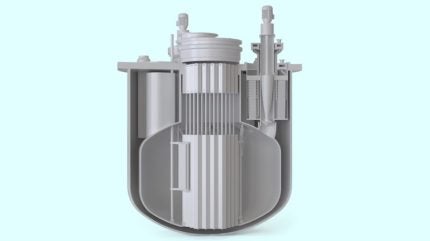
France-headquartered nuclear start-up newcleo has submitted an application to the UK Department of Energy Security & Net Zero (DESNZ) for approval to enter the Generic Design Assessment (GDA) for its LFR-AS-200 small modular lead-cooled fast reactor.
UK regulators – the Environment Agency, the Office for Nuclear Regulation (ONR) and Natural Resources Wales (NRW) – use the GDA to scrutinise new nuclear power plant designs and assess their acceptability for use in the UK. GDA is not a legal requirement, and the regulators will only consider carrying out an assessment for NPP designs that the UK government has asked them to consider. This is because decisions about which designs should be assessed are national strategic matters that are outside the regulators’ responsibility. In May 2021, the UK government opened the GDA process to advanced nuclear technologies, including small modular reactors (SMRs).
Following a successful application, newcleo aims to complete a two-step GDA with the ONR and EA, including a fundamental assessment of their technology by the regulators. Subject to acceptance by DESNZ, the GDA would take around two years starting in Spring 2025. This step follows newcleo’s application to the UK authorities for a Regulatory Justification Decision on the LFR-AS-200 in April – the first such application for an advanced modular reactor.
“We are delighted to be able to proceed with this next step of Newcleo’s journey in the UK,” said newcleo CEO Stefano Buono. “Thanks to our growth as a global team, our lead-cooled fast reactor design has reached new levels of maturity, as has our confidence in the continued development and refinement of our technologies.
However, newcleo has provided very little technical information about its LFR design. The newcleo website includes a mock-up of the reactor. The company claims to “capitalise on 30 years of R&D activity in metal-cooled fast reactors and liquid-lead cooling systems. Newcleo says its reactor design “has been optimised over the last 20 years leading to the concept of an ultra-compact and transportable 200 MWe module with improvements in energy density compared to other technologies”.
Currently, however, the only operating liquid metal-cooled fast reactors are in Russia, using sodium as the coolant. Russia is also constructing the world’s first ever lead-cooled SMR (Brest-OD-300) in Seversk as part of a facility to demonstrate an on-site closed fuel cycle, including novel fuel fabrication. This reactor, based on decades of complex research and development supported by the entire Russian nuclear industry. It is due to begin operation in 2029. By contrast, newcleo’s technology remains in the very early conceptual design stage.
Newcleo has been very active in fundraising and signing partnership and collaboration agreements. Its business now counts over 90 partnerships, and more than 950 employees based in 19 locations across France, Italy, the UK, Switzerland, and Slovakia, including three manufacturing facilities. Since 2021 the company has raised a total of over €537m ($567m) from institutional and individual investors and has seen an increasing number of European players joining newcleo’s growing funding base – which to date counts over 700 shareholders.
Newcleo says the first step of its delivery roadmap will be the design and construction of the first-of-a-kind 30 MWe lead-cooled fast reactor to be deployed in France by 2030, followed by a 200 MWe commercial unit in the UK by 2033. Newcleo will also directly invest in a mixed uranium/plutonium oxide (MOX) plant to fuel its reactors. In 2022, Newcleo announced it had contracted France’s Orano for feasibility studies on the establishment of a MOX plant.
In October, the European Commission selected nine SMR projects – including Newcleo’s LFR – in the initial round of applications to form Project Working Groups under the European Industrial Alliance on SMRs. In December 2023 newcleo said it had been selected as part of the Innovative Nuclear Reactors call for projects under the France 2030 investment plan.
Stéphane Calpena, newcleo Group Global Licensing & nuclear Safety Director said the GDA submission in the UK “follows 18 months of intensive technical discussions with the French regulator and international experts about newcleo LFR design, the MOX manufacturing plant design along with their related safety options. These moves in the UK and France reflects our continued commitment to deployment in France, in the UK as well as our interest in sharing our technology and its advantages elsewhere across Europe.”
To date GDAs have been completed for the EDF/Areva UK EPR, the Westinghouse AP1000, the Hitachi-GE UK ABWR and the CGN/EDF/GNI UK HPR1000 designs. Assessments are currently ongoing for Rolls-Royce SMR Limited’s SMR design, GE Hitachi Nuclear Energy’s BWRX-300 and Holtec International’s SMR-300. Westinghouse’s AP300 was accepted for a GDA review in August.






